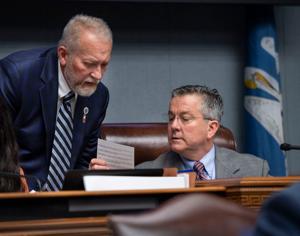
Conservatives in the Louisiana House appear poised to block efforts to raise a key spending limit, defying Democratic Gov. John Bel Edwards and Senate leaders who want to use extra tax dollars on new road and bridge projects.
Lawmakers have about $1.1 billion more than expected in current-year tax revenue plus another $726 million in surplus collections from last year to carve up before they leave Baton Rouge in June. A constitutionally mandated cap on annual spending growth means they can only spend $460 million more in the current year and $500 million in the following budget cycle, forecasters say.
Each chamber of the legislature will need to muster two-thirds majority votes to surpass that threshold, leaving little room for error and creating a flashpoint in budget negotiations.
The 42-member Louisiana Conservative Caucus in a statement Sunday said it opposes raising the cap. The Conservative caucus, formed in 2021, can prevent the required two-thirds vote if it votes as a bloc.
The newly formed Louisiana Freedom Caucus also said in a statement that it opposes raising the limit, though the ultra-conservative caucus’ ability to influence votes in the House is less clear. The group does not publicly share its membership; only four lawmakers have revealed themselves as Freedom Caucus members.
Rep. Blake Miguez, a New Iberia Republican and chairman of the House Republican Caucus, said his 70-member caucus has not reached a consensus on the expenditure limit issue. Miguez said he personally opposes exceeding the limit and favors either sloughing the extra tax collections into a fund to spend under a future Republican governor or using it to pay off debt.
Calculated based on changes to the state’s average annual income, the expenditure cap adds a political hurdle to spending decisions. It applies to dollars that are spent on one-time projects, as Edwards has proposed with the extra tax collections, and to ongoing programs.
Opponents of raising the limit have cast their opposition as part of a desire to limit government spending as the state faces potential budget shortfalls caused by the impending rolloff in 2025 of a temporary .45% sales tax.
“To break the current expenditure limit and allow unfettered government spending at a time when our state is forecasting future deficits is the most fiscally irresponsible action that we could take,” the Conservative Caucus said in a statement.
But the projects proposed by Edwards and backed by Senate President Page Cortez, who has urged lawmakers to break the cap, are one-time costs that supporters argue won’t grow government spending in the long run.
“Our suggestion to you is not that we take this excess and build in ongoing recurring expense for future budget years, but that we take that money and use it on significant investments we would not be able to make if the cap were not exceeded,” Commissioner of Administration Jay Dardenne, Edwards’ chief budget architect, told the House Appropriations Committee Monday.
Surging tax collections over the past two budget years have left Louisiana’s coffers flush with about $1.8 billion in extra cash. The number was lower until lawmakers in the Appropriations Committee learned last week that an additional $231 million had been accounted for.
Good-government groups such as the Public Affairs Research Council urge spending the one-time money on one-time costs. Edwards and his staff have pitched lawmakers on using the money for coastal restoration, road and bridge projects and hurricane debts owed to the federal government.
House Republicans responded with a plan to avoid breaking the cap by sloughing the extra money off to pay some of the state’s massive debt tied up in public employee pensions. They’re also discussing a second proposal to pay off some of that debt: diverting about $880 million in revenue from the temporary .45% sales tax away from the state’s budget to pay off debt tied to teacher pensions.
Doing so would free up dollars in local schools’ budgets; the schools could use the extra money to give teachers pay raises Edwards has proposed under his draft budget, argues the proposal’s sponsor, Ruston Republican Rep. Christopher Turner.
The House voted 72-25 Monday in favor of Turner’s bill, agreeing to send about $883M from the final two years of the 0.45% state sales tax to pay off retirement debt and road repairs rather than letting it flow to state general fund. The legislation moves now to the Senate.
The two proposals — using the extra taxes to pay down debt, and Turner’s bill — would accomplish key goals for certain conservative factions in the legislature.
Paying off some of the state’s hefty pension debt would not require lawmakers to break the spending limit, and sending the decision about teacher raises to local schools would alleviate pressure on lawmakers to have the state foot that bill.

Leave a Reply